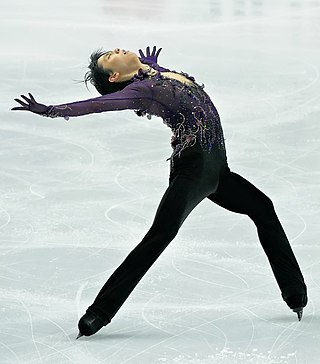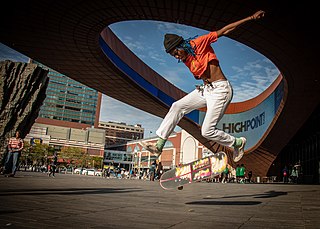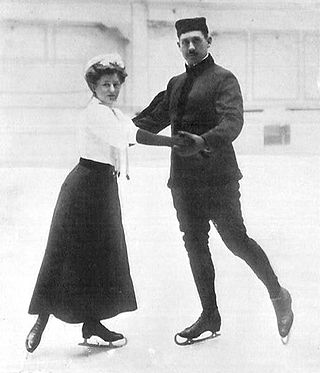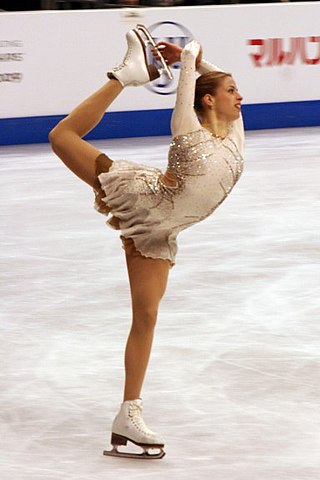
Figure skating is a sport in which individuals, pairs, or groups perform on figure skates on ice. It was the first winter sport to be included in the Olympic Games, with its introduction occurring at the 1908 Olympics in London. The Olympic disciplines are men's singles, women's singles, pair skating, and ice dance; the four individual disciplines are also combined into a team event, which was first included in the Winter Olympics in 2014. The non-Olympic disciplines include synchronized skating, Theater on Ice, and four skating. From intermediate through senior-level competition, skaters generally perform two programs, which, depending on the discipline, may include spins, jumps, moves in the field, lifts, throw jumps, death spirals, and other elements or moves.

Ice skating is the self-propulsion and gliding of a person across an ice surface, using metal-bladed ice skates. People skate for various reasons, including recreation (fun), exercise, competitive sports, and commuting. Ice skating may be performed on naturally frozen bodies of water, such as ponds, lakes, canals, and rivers, and on human-made ice surfaces both indoors and outdoors.

Skateboarding is an action sport that involves riding and performing tricks using a skateboard, as well as a recreational activity, an art form, an entertainment industry job, and a method of transportation. Originating in the United States, skateboarding has been shaped and influenced by many skateboarders throughout the years. A 2009 report found that the skateboarding market is worth an estimated $4.8 billion in annual revenue, with 11.08 million active skateboarders in the world. In 2016, it was announced that skateboarding would be represented at the 2020 Summer Olympics in Tokyo, for both male and female teams. Skateboarding made its Olympic debut in 2020 and was included in the 2024 games.

Speed skating is a competitive form of ice skating in which the competitors race each other in travelling a certain distance on skates. Types of speed skating are long-track speed skating, short-track speed skating, and marathon speed skating. In the Olympic Games, long-track speed skating is usually referred to as just "speed skating", while short-track speed skating is known as "short track". The International Skating Union (ISU), the governing body of competitive ice sports, refers to long track as "speed skating" and short track as "short track skating". Long track speed skating takes place on a 400m ice track, while short track takes place on a 111m track.

Winter sports or winter activities are competitive sports or non-competitive recreational activities which are played on snow or ice. Most are variations of skiing, ice skating and sledding. Traditionally, such games were only played in cold areas during winter, but artificial snow and artificial ice allow more flexibility. Playing areas and fields consist of either snow or ice.

Short-track speed skating is a form of competitive ice speed skating. In competitions, multiple skaters skate on an oval ice track with a length of 111.111 metres (364.54 ft). The rink itself is 60 metres (196.85 ft) long by 30 metres (98.43 ft) wide, which is the same size as an Olympic-sized figure skating rink and an international-sized ice hockey rink. Related sports include long-track speed skating and inline speed skating.

Roller skating is the act of travelling on surfaces with roller skates. It is a recreational activity, a sport, and a form of transportation. Roller rinks and skate parks are built for roller skating, though it also takes place on streets, sidewalks, and bike paths.

The World Figure Skating Championships, commonly referred to as "Worlds", are an annual figure skating competition sanctioned by the International Skating Union. Medals are awarded in men's singles, women's singles, pair skating, and ice dance. Generally held in March, the World Championships are considered to be the most prestigious of the ISU Figure Skating Championships. With the exception of the Olympic title, a world title is considered to be the highest competitive achievement in figure skating.

Nancy Ann Kerrigan is an American former figure skater. She won bronze medals at the 1991 World Championships and the 1992 Winter Olympics, silver medals at the 1992 World Championships and the 1994 Winter Olympics, as well as the 1993 US National Figure Skating Championship. Kerrigan was inducted into the United States Figure Skating Hall of Fame in 2004.

Dorothy Stuart Hamill is a retired American figure skater. She is the 1976 Olympic champion and 1976 World champion in ladies' singles.

Roller derby is a roller skating contact sport played on an oval track by two teams of five skaters. It is played by approximately 1,250 amateur leagues worldwide, though it is most popular in the United States.

The International Skating Union (ISU) is the international governing body for competitive ice skating disciplines, including figure skating, synchronized skating, speed skating, and short track speed skating. It was founded in Scheveningen, Netherlands, in July 1892, making it one of the oldest international sport federations. The ISU was formed to establish standardized international rules and regulations for the skating disciplines it governs, and to organize international competitions in these disciplines. It is now based in Switzerland.

The European Figure Skating Championships are an annual figure skating competition in which figure skaters compete for the title of European champion. Medals are awarded in men's singles, women's singles, pair skating, and ice dance. The event is sanctioned by the International Skating Union (ISU) and is the sport's oldest competition. The first European Championships were held in 1891 in Hamburg, Germany, and featured one segment, compulsory figures, with seven competitors. They have been held continuously since 1891, with only five interruptions, and have been sanctioned by the ISU since 1893. Women were allowed to compete for the first time in 1930, which is also the first time pair skating was added to the competition. Ice dance was added in 1954. Only eligible skaters from ISU member countries in Europe are allowed to compete.

Figure skating was first contested in the Olympic Games at the 1908 Summer Olympics. Since 1924, the sport has been a part of the Winter Olympic Games.

Pair skating is a figure skating discipline defined by the International Skating Union (ISU) as "the skating of two persons in unison who perform their movements in such harmony with each other as to give the impression of genuine Pair Skating as compared with independent Single Skating". The ISU also states that a pairs team consists of "one Woman and one Man". Pair skating, along with men's and women's single skating, has been an Olympic discipline since figure skating, the oldest Winter Olympic sport, was introduced at the 1908 Summer Olympics in London. The ISU World Figure Skating Championships introduced pair skating in 1908.

The World Junior Figure Skating Championships, commonly referred to as "World Juniors" or "Junior Worlds", are annual figure skating competitions sanctioned by the International Skating Union in which figure skaters within a designated age range compete for the titles of World Junior Champion.

Single skating is a discipline of figure skating in which male and female skaters compete individually. Men's singles and women's singles are governed by the International Skating Union (ISU). Figure skating is the oldest winter sport contested at the Olympics, with men's and women's single skating appearing as two of the four figure skating events at the London Games in 1908.
The short program of figure skating is the first of two segments of competitions, skated before the free skating program. It lasts, for both senior and junior singles and pair skaters, 2 minutes and 40 seconds. In synchronized skating, for both juniors and seniors, the short program lasts 2 minutes and 50 seconds. Vocal music with lyrics is allowed for all disciplines since the 2014–2015 season. The short program for single skaters and for pair skaters consists of seven required elements, and there are six required elements for synchronized skaters.
The free skating segment of figure skating, also called the free skate and the long program, is the second of two segments of competitions, skated after the short program. Its duration, across all disciplines, is four minutes for senior skaters and teams, and three and one-half minutes for junior skaters and teams. Vocal music with lyrics is allowed for all disciplines since the 2014—2015 season. The free skating program, across all disciplines, must be well-balanced and include certain elements described and published by the International Skating Union (ISU).
The 2015–16 ISU World Standings and Season's World Ranking, are the World Standings and Season's World Ranking published by the International Skating Union (ISU) during the 2015–16 season.